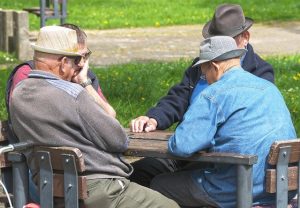 I have many happy memories of playing games with my grandparents as a family and individually. Christmas wasn’t Christmas until we’d collapsed into a heap of hysterical laughter after a family game of Pit or the card game Cheat.
I have many happy memories of playing games with my grandparents as a family and individually. Christmas wasn’t Christmas until we’d collapsed into a heap of hysterical laughter after a family game of Pit or the card game Cheat.
Holidays with my grandparents meant games of Cribbage, Whist, Gin Rummy, other card games and Scrabble. We had so much fun and it was a lovely sociable thing to do.
It has now been shown that games can be a wonderful way to help the elderly keep their minds active. Not only do they help to improve memory and cognitive skills, but they can also help to improve social skills.
Studies have shown that elderly people who play games regularly have a decreased rate of mental decline. This is because stimulating leisure activities may help protect elderly people from developing dementia or cognitive decline as playing games can help to build up a person’s “cognitive reserve”.
Cognitive reserve is one of the main reasons why some people are more affected by age-related brain changes and Alzheimer’s disease than others. People with a lot of cognitive reserve can tolerate more of these changes and still function well.
Playing board games is a fun and stimulating activity for elderly people, even if they are advanced in age. Board games offer specific advantages compared to other games or activities. These games require participants to be exposed to new things, take initiatives, plan, and adapt to winning or losing. Board games also give people immediate pleasure and can be enjoyed with family members, friends, or strangers. Board games also promote social interaction and exchange between different generations.
Games like bingo or cards are a fun way for families and friends to spend time together. They can be adapted to the players’ skill level, and anyone can play them no matter the weather. If someone has a physical disability, mild hearing or visual impairment, they can still participate in these activities. Other activities like reading, travelling, gardening, doing odd jobs or playing sports don’t offer the same advantages.
People who play board games can keep their minds working well. This could help prevent dementia, but more research needs to be done to be sure.
You can read more about this on the US National Library of Medicine’s website
A study, which was published in the journal “Frontiers in Aging Neuroscience”, found very little evidence that playing games helped with transferable mental skills, but there was still an observable difference in how well each person played individual games after plenty of practice. This factor alone means that there is more enjoyment from playing when you know there is a good chance you can win!
Dr Drew Altschul, of the University of Edinburgh’s School of Philosophy, Psychology and Language Sciences, said:
“These latest findings add to evidence that being more engaged in activities during the life course might be associated with better thinking skills in later life. For those in their 70s or beyond, another message seems to be that playing non-digital games may be a positive behaviour in terms of reducing cognitive decline.”
Some games that have been found to have a positive effect on the elderly are :
1. Bingo
2. Memory games
3. Card games
4. Crossword puzzles
5. Sudoku
6. Scrabble
7. Word search puzzles
8. Mahjong
9. Checkers
10. Chess
These games help to improve memory, concentration, and problem-solving skills. Games that require strategy and planning are especially beneficial for the elderly, as they help to keep the mind active and engaged.
So, if you’re looking for a way to help the elderly keep their minds active, playing games is a great option. Not only will it help to improve memory and cognitive skills, but it can also be a great way to socialize and interact with others.

